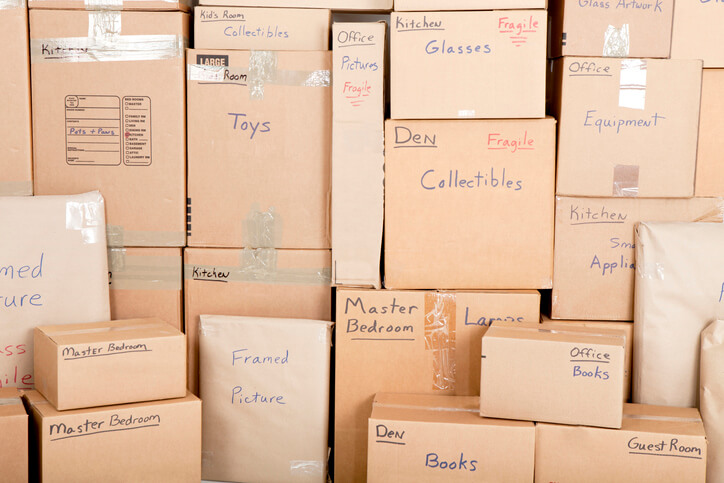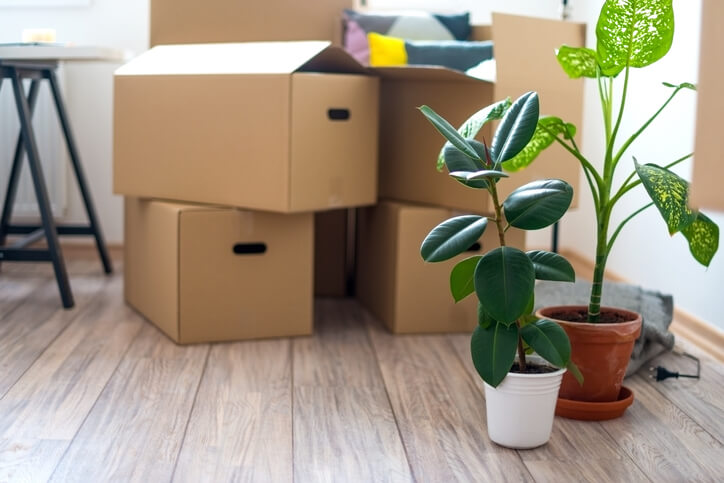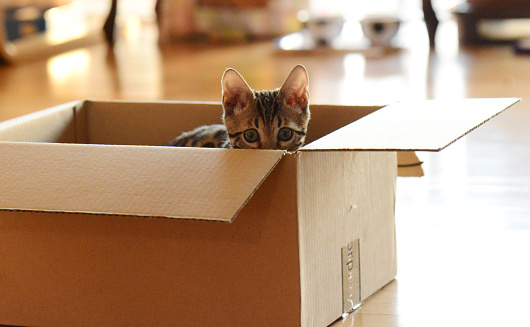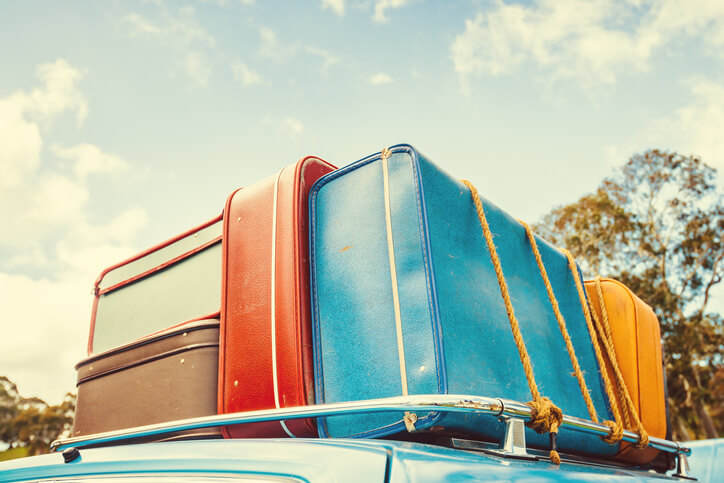We know moving can be stressful. For some, it’s one of the most complex operations they’ll ever have to coordinate; and even if you’ve relocated many times, gearing up to move again can feel daunting. Partly, this is because there’s so much to plan and so many small details to organize. In this guide, we’re going to tell you all about one of our best moving tips—where can I get free moving boxes?
If possible, start planning your move and acquiring your moving boxes six to eight weeks prior to your move day.
Where Can I Get Free Moving Boxes?
Moving requires a lot of boxes, and you might end up using them only once. Naturally, most people would prefer to get those boxes for free. Luckily, there are many ways to do so. However, before you rush out in search of cardboard castoffs, be aware that the options below are only suggestions, not guarantees, so we recommend calling ahead to businesses to ask if free boxes are available.
U-Haul Box Exchange
U-Haul offers two programs that can help you snag discounted or free moving boxes.One is the “take a box, leave a box” system at U-Haul company stores and some independent U-Haul dealers. Customers can drop off old boxes here, or search for used moving boxes to take home for free. The other is the Box Exchange, a forum on U-Haul’s website where anyone can make a post requesting free moving boxes or offering up their used supplies for free or at a low price. Whether your post will attract any offers depends on your location and timing; especially outside of major cities, posts can be few and far between. But the process is simple, so if you’re not in a hurry, it’s worth a try.
Friends and Neighbors
Of course, there’s always the time-honored method of asking friends and family where to get free moving boxes and whether they have any boxes stashed away. But don’t forget to ask your social media contacts, too. If you have a Facebook account, post a friendly request stating that you’re moving soon, looking for used boxes, and would appreciate if anyone had some to spare or knew of another good source.
Community Groups
Another way to use Facebook to find free moving boxes can be inquiring via a post to a local group. If you don’t belong to one already, search for groups in your city or neighborhood, or even your street. Other local groups can be found on websites like Craigslist, Freecycle and Nextdoor. You may also find others specific to your town or community. Each works slightly differently, but in general, you can scan the listings to see what others are giving away, and create your own post asking for what you need. When meeting up with strangers to exchange goods, be cautious and try to meet in a public, well-lit place. Some city police departments offer their parking lots as safe locations for such exchanges.

Large Retailers
You may be able to source big free moving boxes from, well, big box stores – think Walmart, Costco, PetSmart, Sam’s Club, Home Depot, Office Depot, Target, K-Mart, and Best Buy. Some retailers may not give away boxes – for free or otherwise – however, it’s worth a call to ask. If they agree, ask them about the most convenient day and time for you to show up. But don’t grab any old box just because a store lets you have it; if a box is stained, damaged, oddly shaped, or has no top, it’s probably not a good bet.
More Unexpected Places to Get Moving Boxes
From your local elementary school to a small business, you may be surprised at all the places you can score free moving boxes.
Recycling Drop-off Points
This is an especially convenient option if you’re already planning on recycling items from your big pre-moving decluttering session. While you’re at the recycling center, ask if there’s a designated area for unused boxes for the taking. If you do find boxes, don’t just grab them all in your excitement; make sure any boxes you take are suitable, size-and shape-wise, and in good condition.
Grocery Stores
Local grocery stores get frequent shipments of goods in cardboard boxes. The next time you go food shopping, speak to the store manager about your future move and ask if you can snag some boxes headed for the recycling bin. Before you take any boxes home, make sure they’re in good condition; a box that contained vegetables, for example, might be damp and covered in soil. On the other hand, banana and apple boxes, which are ventilated to allow the fruit to breathe, can nevertheless be great packing boxes because they’re sturdy.
Schools
Call nearby elementary, middle or high schools to inquire about potential delivery boxes you could reuse. This is an especially good bet if you’re moving in September, when schools have just received the most deliveries, but they also receive shipments of food and supplies throughout the school year, so it’s worth a try regardless of your timing.
Your Workplace
Some corporations no longer allow employees to take boxes for free, but if yours does, this can be an easy way to acquire free moving boxes. Ask around, starting with your office manager or at the loading dock. If that doesn’t work out, your workplace may also have an online buy/sell community. (This option is probably easiest if you drive to work as opposed to using public transportation, but what you’re willing to carry on the bus is up to you!)
Office Supply Store
Boxes used to ship stock to stores like OfficeMax and Staples are usually sturdy, and often come with lots of packing material too. The best boxes to score, if they let you, are those that printer/copier paper are shipped in. Some of those boxes have a lid already, so you only need minimal tape. These relatively small, tough boxes are ideal for packing small, heavy items like books, or fragile items like dishes. Because you can easily lift them yourself, they’re also good for anything you’re bringing with you in your car.
Bookstores
Another potential source for smaller, sturdy boxes are bookstores. Ask the manager at Barnes & Noble or Books-A-Million, and also check with smaller independent booksellers in your area.

Bars and Restaurants
Eateries get frequent deliveries, and the staff might be happy to hand some boxes off to you instead of breaking them down at the end of their shift. Some of these boxescan be perfect moving supplies, e.g., strong liquor boxes designed for heavy and breakable items. Some boxes may not have lids, but these can work for items you’re transporting in your car, like plants, clothes, or toiletries. As with grocery stores, beware of restaurant boxes with stains or strong food smells that can be absorbed by your packed items.
Pharmacies
Major drugstore chains like Walgreens, CVS, or Rite Aid, as well as local independent pharmacies, are another option. Talk to a manager first, and if they agree, coordinate a pick-up time on their delivery day or whatever time benefits the store. When placing boxes that aren’t broken down into your vehicle, save space by nesting them, small inside medium inside large.
Liquor Stores
As mentioned above, liquor boxes are solid, but generally small, and often have the tops cut off. Plan to use them creatively by making lids yourself or packing items that don’t need to be sealed. The cases that six-packs arrive in can also be excellent packing boxes, though they’re not as sturdy. Be aware that liquor boxes are often stapled together, so watch for rogue staples that can poke you or damage your packed items.
Home Improvement Stores
When you need large boxes, e.g. the kind that major appliances come in, the large retailers mentioned above, like Lowes and Home Depot, might be an option. However, store policies may prevent them from giving these away. Try smaller, locally owned hardware or appliance stores where owners may be more flexible and happy to do a favor for a customer and give them some free moving boxes.
Alternatives to Used Moving Boxes
To save money there are many alternatives to used moving boxes like using drawers (cover the tops with plastic wrap or another makeshift lid that can be secured in place with tape.) Use every bag in the house, not just suitcases but overnight bags, tote bags, and reusable cloth grocery bags, which are great for books if you prefer to lift heavy loads over your shoulder. If you’re driving, you can pack pantry items, beauty products, paper goods, and any other light objects in paper or even plastic bags from the grocery or drugstore. Laundry bags and large garbage bags are great for soft items like clothing and bedding. If you have any sturdy reusable shopping bags, like the over-sized IKEA FRAKTA, they can be a good solution for last-minute, awkwardly shaped items that you need to transport in your car (e.g. water pitchers or cleaning supplies.)
One newer and greener alternative to traditional moving boxes is to rent plastic moving boxes. In select locations, companies like U-Haul (their option is called Ready-To-Go Boxes), BungoBox, and Rent a Green Box will send you reusable plastic bins and retrieve them from you once your move is complete. Pricing is based on how many boxes you need and how long you keep them.
Master the Packing Process
Packing is never fun, but the process always goes better when you can do it in as organized a manner as possible. And understanding what supplies you need, as well as how to find them, will help you pack and move all your things safely and easily. And then you’ll only have to worry about unpacking.







I recently moved from New York and found a bunch of free moving boxes on BoxGiver.com